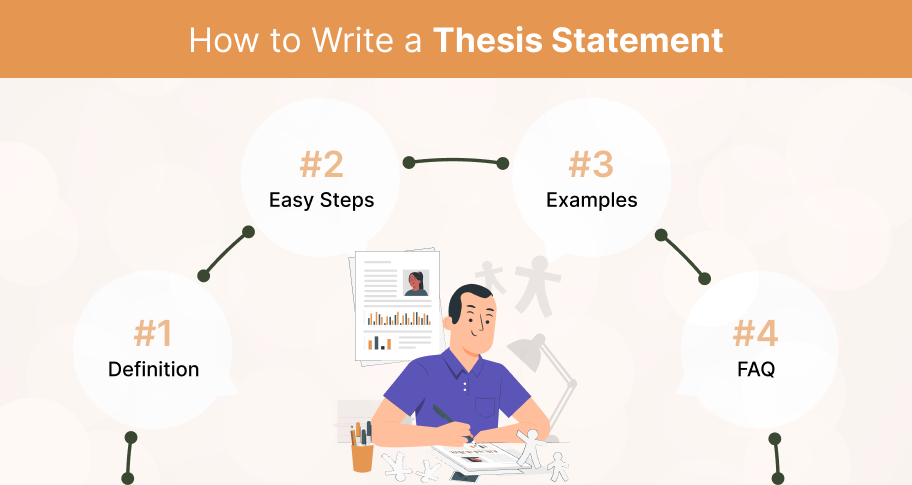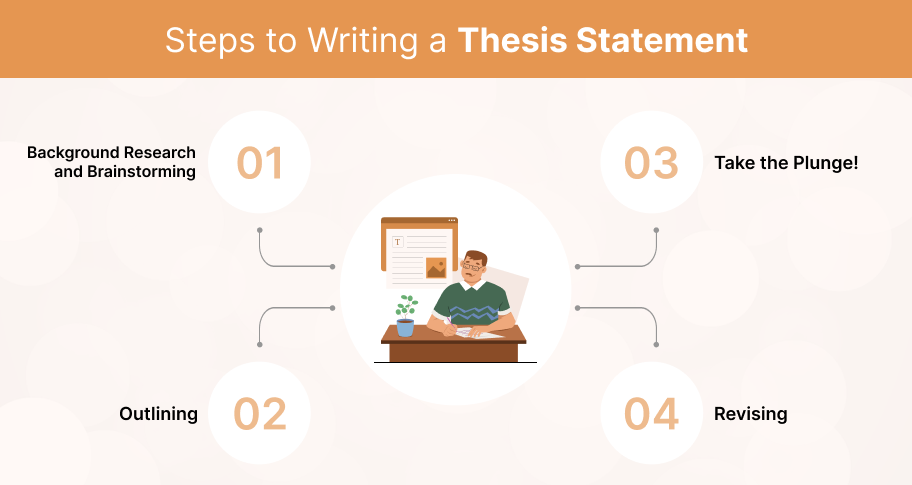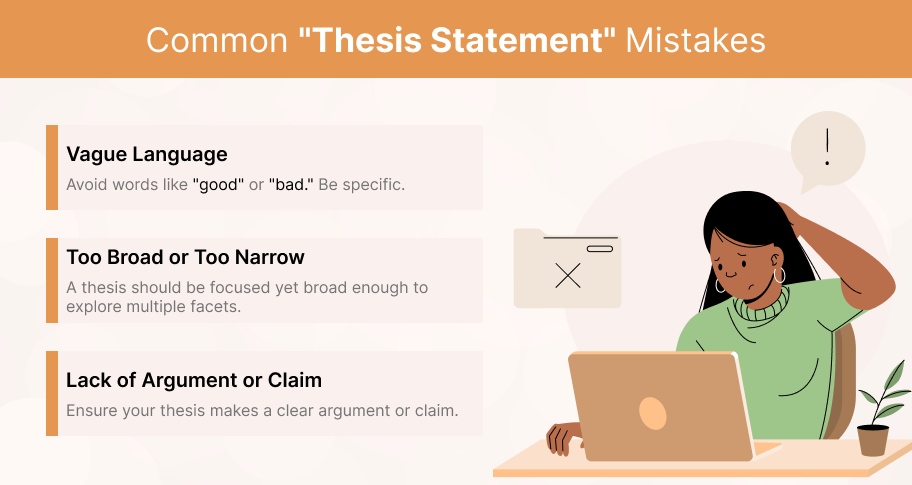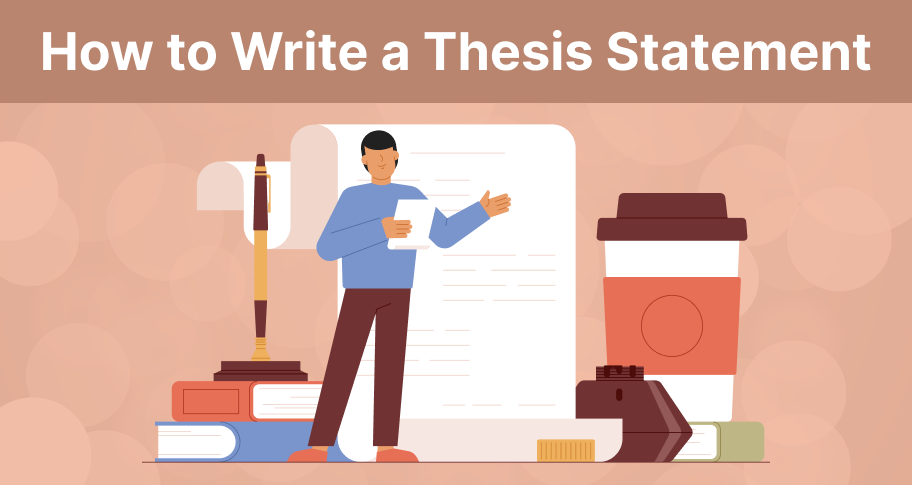Introduction
A strong thesis statement is the lynchpin of all great essays.
Why? One of the things that gets drilled into you when learning how to write academic or expository essays is that thesis statements are important for several reasons: first off, the thesis statement tells what your essay is about—which is a good thing for everyone. (No cliffhangers)! Serious readers want to know what the subject is before they engage with new content. You don’t walk into a movie without having some idea of what it’s about, do you?
Second, the thesis statement presents a position. It tells what, or why, or how. It shows the reader right off the bat that you know what you’re talking about.
In other words, the thesis statement is where you earn the reader’s trust.
In this article, we are going to help you better understand the art of writing a good thesis statement. You will learn why thesis statements are so important in academic writing, and how to improve your own thesis statements.

What Is a Thesis Statement?
Definition
A thesis statement is a single sentence that tells the main idea, point, argument or purpose of an essay. Its primary role is to guide the writer’s ideas and provide a roadmap for the reader. A strong thesis statement is clear, concise, and specific, setting the stage for a well-structured essay.
Function
Depending on the type of essay you are writing, your thesis statement could take on many different forms. The form of the thesis statement matches the purpose of your essay. If you are writing an argumentative essay, your thesis statement would be argumentative. A descriptive essay might have a more informative thesis statement. Some thesis statements outline several core components of your essay, and others summarize the main points you will make.
Characteristics
Regardless of its type, ultimately your thesis statement should be as punchy as possible. You want to make your reader genuinely interested in what you have to say, which means writing a thesis statement that is interesting and specific. It should be brief, to the point, clear, concise, and coherent.
Types of Thesis Statement
Just as there are different types of essays, there are also different types of thesis statements. The main types you are likely to write include the analytical thesis statement, the expository or explanatory thesis statement, and the argumentative thesis statement.
- Analytical Thesis Statement: This type breaks down an idea or issue into its components, evaluates the issue, and presents this breakdown and evaluation to the audience. For example, “The increase in greenhouse gases is leading to climate change due to the industrial revolution, deforestation, and extensive use of fossil fuels.”
- Expository Thesis Statement: This explains something to the audience. For example, “The process of photosynthesis is essential for plant life as it converts light energy into chemical energy.”
- Argumentative Thesis Statement: This makes a claim that others might dispute. For example, “School uniforms should be mandatory in all schools because they reduce peer pressure, enhance discipline, and create a sense of community.”
How to Write a Strong Thesis Statement
Here are the main steps in writing a good thesis statement:
- Background Research and Brainstorming
- Outlining
- Take the Plunge!
- Revising
Step I: Background Research
It might surprise you to learn that the first step in writing a good thesis statement has nothing at all to do with writing! Before you even begin writing, you need to know what you are going to say, and the only way to know what to say in the essay is to do some background research on the topic.
If you are not writing a research essay, then brainstorming serves the same purpose as research. For example, a narrative or descriptive essay does not necessarily require formal research, but it might require you to reflect on your personal experiences. Reflecting on your personal experiences can be considered a type of “research,” in that you are digging deep and examining as much information or detail as possible.
Step II: Outlining
You will now take what you have learned in your research or brainstorming session and begin to outline your essay. An outline helps you organize your thoughts and plan your essay. Just as you cannot build a house properly without a blueprint, you cannot write an essay properly without an outline. You might be able to outline your thoughts in your head, but some students find that a written outline helps them stay focused. Once you outline your main ideas, you will realize that your thesis statement practically writes itself!
Step III: Take the Plunge!
Do not be afraid of writing your thesis statement. Now that you pretty much know what you are going to say, or what you want to prove, in your essay, just write a thesis statement using the handy tips we are offering you here in this article.
Step IV: Revising
You will often find you need to revise your thesis statement. Perhaps you found that your original ideas lacked substantive evidence to support them, or perhaps you realized that your claim was too weak. Regardless of the reason, never be afraid to change your mind.
To Recap:
- Choose a Topic: Select a relevant and manageable topic that interests you. Tips: Go after something you know a lot about, wouldn’t mind researching more, or have a real love for. It will be much harder to write well if you don’t care about the subject.
- Formulate the Statement: Start with a question about your topic, and then answer it with your thesis statement. Make sure it is clear and focused by revising it again and again.
- Examples of Strong vs. Weak Thesis Statements: A weak thesis might be, “Many people consume fast food.” A strong thesis would be, “Consuming fast food regularly leads to severe health issues such as obesity, diabetes, and heart disease.”

Thesis Statements for Types of Essays
Compare/Contrast Essays
Weak: London and Paris are totally different cities.
Strong: London and Paris are both major world capitals, but differ in terms of lifestyle, history, language, and culture.
Explanation: The weak thesis statement lacks specificity and clarity. Everyone knows London and Paris are totally different cities, but why are they different? The second, stronger thesis statement indicates that you are going to compare the two capitals on the basis of lifestyle, history, language, and culture.
Weak: Both Hamlet and Oedipus are tragic figures, with similar tragic flaws related to their blindness to the truth, which is why their hubris gets them into trouble.
Strong: Tragic heroes Hamlet and Oedipus both have good intentions as leaders, but their pride and stubbornness lead to their devastating demise.
Explanation: Notice how the weaker of these statements is incoherent and cluttered. The second statement shows how you intend to compare and contrast Hamlet and Oedipus.
Argumentative Essays
Weak: Obamacare is a failure because Americans cannot deal with socialism.
Strong: The individual mandate aspect of the ACA presented legal problems, which is why the Trump administration was so easily able to dismantle it.
Explanation: A good thesis statement does not just make a broad claim, but hones in on the specific issues at hand, especially in an argumentative essay.
Persuasive Essays
Weak: You should invest in Bitcoin now because the price is only going to be higher later on.
Strong: Although risky, cryptocurrency investments will pay off in the future because they are insulated both from market instability and from global currency fluctuations.
Explanation: The weak thesis statement is simplistic, lacks creativity, and does not effectively lure the reader into the essay. On the contrary, the second statement provides a clear direction for the essay. The reader wants to know how you are going to prove your point.
Expository Essays
Weak: Microsoft’s holistic marketing strategies have paid off for the company, allowing it to regain its competitive advantage and market share.
Strong: Microsoft’s holistic marketing strategies have created a more consistent and relatable brand identity, which proves critical in the age of social media and interactive consumer engagement.
Explanation: In an expository essay, you want to explain both why something happens and also how. The weaker of these two thesis statements tells the reader what holistic marketing has done for Microsoft. However, the stronger one states explicitly why holistic marketing is important.
Narrative Essays
Weak: Last summer, I learned about the importance of helping others.
Strong: A major crisis situation encourages us to dig deep, finding an inner source of strength and determination that can be used to uplift, inspire, and empower other people.
Explanation: By now you can recognize that the weaker of these two statements lacks specificity. The strong thesis statement provides clarity and nuance, while still remaining concise.
Descriptive Essays
Weak: Defined by their brightly colored plumage and large shape, macaws make great pets.
Strong: Perennially popular as pets, macaws are beloved for their intelligence and ability to learn, their engagement with people, and of course, their gorgeous rainbow colored plumage.
Explanation: Although veering on containing too much information, the stronger of these two thesis statements offers much more detail than the weaker one and drives the essay forward based on this main idea.
Cause and Effect Essays
Weak: As slavery never did align with core Constitutional values, the Civil War was fought ultimately to assert the character of the nation and to enable a strong central government to prevent the encroachment of universal rights and freedoms.
Strong: The Civil War was fought ultimately to enable a strong central government to prevent the encroachment of universal rights and freedoms, but failed to resolve racism.
Explanation: The weaker thesis statement is overly cluttered, unclear, and inconsistent. The stronger thesis statement illustrates the causes of the war, and also touches lightly on some of the effects, or lack thereof.
Word of Advice:
When you write your thesis statement, ask yourself if it ticks all of these boxes:
Concise
A good thesis statement is concise. However, one of the most challenging things about writing a good thesis statement is packing in all the information into one single sentence. With practice, you will find that the adage “keep it simple, stupid” applies well in thesis statement construction. The thesis statement is your main argument. A poorly written thesis statement is clunky, whereas a good one is concise, pithy, and succinct.
Clear
All good thesis statements are clear and detailed. Almost by definition, a thesis statement conveys a sense of clarity and purpose in your essay. The best way to be clear when writing your thesis statement is by choosing the brightest words possible. A poorly written thesis statement is nebulous or obscure, whereas a good thesis statement makes it abundantly clear what you are going to say in your essay.
Consistent and Coherent
You would be surprised how many thesis statements are inconsistent with the remainder of the essay. One way a thesis statement can cohere with the rest of the essay is with tone, and another way is with content. The tone of the thesis statement should be consistent with the tone of the rest of your introduction and the rest of the essay. Likewise, the content of your thesis statement should accurately communicate your main arguments. If necessary, you can always revise your thesis statement later if you find that it is not logical or coherent. A poorly written thesis statement has nothing to do with the rest of the essay, whereas a good thesis statement is logically consistent and coherent.
Creative
The best thesis statements stand out from the crowd. Be creative, and do not be afraid to make a stand. You can be a little controversial when writing your thesis statement, because your reader will be much more interested in what you have to say if you are saying something unique. Of course, some academic essays ask stock questions. When answering those stock questions, though, it helps to offer a new perspective.
Common Mistakes to Avoid
1.Vague Language
Avoid words like “good” or “bad.” Be specific.
-
- Weak: Uncle Jerry was always a good guy, which is why the townsfolk were so devastated by his death.
- Strong: Previously torn apart by poverty and pessimism, our community came together to honor the life of Uncle Jerry because his organization the Sunshine Center had touched the lives of almost every resident.
- Explanation: The former thesis statement lacks specificity. Even a narrative essay needs a strong and almost controversial thesis statement. In this case, the writer claims that Uncle Jerry was almost single-handedly responsible for bringing together a fragmented community.
2.Too Broad or Too Narrow
A thesis should be focused yet broad enough to explore multiple facets.
- Weak: The short story by Charlotte Perkins Gilman, “The Yellow Wallpaper,” uses literary devices like simile and symbolism to show that the society oppresses women by labeling them as crazy and trapping them into a domestic life.
- Strong: In “The Yellow Wallpaper,” Charlotte Perkins Gilman delivers a scathing commentary on patriarchal social norms and institutions using potent literary symbolism and metaphor.
- Explanation: Both thesis statements contain a lot of information, but the second one pares it down, offering a more concise road map for the expository essay.
3.Lack of Argument or Claim
Ensure your thesis makes a clear argument or claim.
- Weak: Iran and Saudi Arabia are waging proxy wars in Yemen, Syria, and perhaps even Bahrain, reflecting the Sunni-Shia divide and creating tremendous instability in the region.
- Strong: By arming and training insurgents and fomenting political unrest, Saudi Arabia and Iran are vying for regional dominance.
- Explanation: The weaker thesis statement rambles, lacks focus or clarity, and fails to actually make a statement. The second thesis statement shows how the writer will focus more exclusively on how the proxy wars are being waged and also why.

Refining Your Thesis Statement
Revision Tips
Refining your thesis statement is ultra-important because no statement is perfect right out of the gate. Start by revisiting your statement after writing your first draft. You’ll have a much better idea of what your paper actually does, and it will be easier to refine your thesis as a result.
Make sure your thesis statement is specific, clear, and debatable. Ask yourself if it directly addresses the essay prompt and if it makes a compelling argument. Simplify complex sentences and remove vague language. Consider feedback from peers or mentors and be open to making adjustments.
Checklist
- Clarity: Is the thesis statement clear and easily understood?
- Specificity: Does it address a specific aspect of the topic?
- Argument: Does it make a clear, arguable claim?
- Focus: Is it focused and not too broad or too narrow?
- Relevance: Does it directly relate to the essay prompt or question?
If you follow these tips and using the checklist, your thesis statement will be strong and effective.
View 120,000+ High Quality Essay Examples
Learn-by-example to improve your academic writing
Thesis Statement Examples
For Different Essay Types
- Analytical Essays:
- “The symbolism in ‘The Great Gatsby’ reveals the conflicting desires of wealth and morality in 1920s America.”
- “A deep analysis of Beethoven’s symphonies shows his transition from classical to romantic music.”
- Expository Essays:
- “Photosynthesis is essential for plant life, converting light energy into chemical energy through a complex process.”
- “The industrial revolution significantly changed societal structures by fostering urbanization and technological innovation.”
- Compare and Contrast Essays:
- “While both socialism and capitalism aim to provide economic stability, socialism focuses on equal distribution of wealth, whereas capitalism emphasizes individual profit.”
- “Though cats and dogs are popular pets, their dietary needs and social behaviors are remarkably different.”
- Informative Essays:
- “The history of the internet highlights its evolution from a military project to a global communication network.”
- “Diabetes management involves lifestyle changes, regular monitoring, and medication to maintain blood sugar levels.”
- Rhetorical Analysis Essays:
- “Martin Luther King Jr.’s ‘I Have a Dream’ speech effectively uses rhetorical devices such as repetition and metaphor to inspire change.”
- “Jane Austen’s ‘Pride and Prejudice’ employs irony and free indirect discourse to critique social norms.”
- Persuasive Essays:
- “School uniforms should be mandatory to reduce peer pressure and promote a sense of equality among students.”
- “The government should invest in renewable energy sources to combat climate change and reduce dependence on fossil fuels.”
- Argumentative Essays:
- “Legalizing marijuana will reduce crime rates and provide economic benefits through taxation.”
- “Social media platforms should be regulated to prevent the spread of misinformation and protect user privacy.”
- Research Papers:
- “Genetic modification in agriculture can improve crop yields and resistance to pests, but it raises ethical and environmental concerns.”
- “Climate change mitigation requires global cooperation and innovative technologies to reduce carbon emissions.”
For Various Subjects
- History:
- “The fall of the Roman Empire was due to a combination of internal decay and external invasions.”
- “The American Civil War fundamentally reshaped the nation’s political and social landscape.”
- Literature:
- “In ‘1984,’ George Orwell presents a dystopian society to warn against the dangers of totalitarianism.”
- “Shakespeare’s portrayal of ambition in ‘Macbeth’ highlights the destructive nature of power.”
- Science:
- “CRISPR technology offers potential cures for genetic diseases but raises ethical questions about genetic manipulation.”
- “Climate change impacts global weather patterns, leading to more frequent and severe natural disasters.”

For Specific Types
- Good:
- “A balanced diet and regular exercise are essential for maintaining good health.”
- “Effective communication skills are crucial for career success in any field.”
- Strong:
- “Implementing renewable energy sources is crucial to combat climate change and ensure sustainable development.”
- “Educational reforms are needed to address the disparities in quality and access in public schooling.”
- College Level:
- “The rise of artificial intelligence presents both opportunities and challenges for the modern workforce.”
- “Urbanization in the 21st century requires innovative planning to address housing and infrastructure needs.”
- High School Level:
- “Recycling programs in schools can significantly reduce waste and promote environmental awareness.”
- “Participation in extracurricular activities improves students’ social skills and academic performance.”
- Kids:
- “Reading books every day can help improve children’s vocabulary and imagination.”
- “Playing sports teaches kids important values like teamwork and perseverance.”
- Speech:
- “Public speaking skills are essential for effective communication and professional success.”
- “Community service should be a mandatory part of the high school curriculum to foster civic responsibility.”
- 3 Point:
- “Exercise improves mental health, boosts physical fitness, and enhances overall well-being.”
- “Online learning provides flexibility, broadens access to education, and promotes self-discipline.”
Using Thesis Statements in Your Essay
Placement in the Introduction
Students are usually asked to place their thesis statement at the end of the introduction to their paper. There is a reason for this general rule. The introduction sets the stage—then the action commences (i.e., the body of the essay). Think of the thesis statement almost like the chorus of your favorite song. A song would seem weird if the chorus came first. The chorus of the song is like a thesis statement, adding structure and providing the main point of the composition.
Supporting with Evidence
Each body paragraph should support the thesis statement by presenting evidence and analysis. The best way to do this is to start with a topic sentence that relates directly to the thesis, followed by evidence such as quotes, data, or examples. Then, analyze the evidence and explain how it supports your thesis. In this way, each paragraph stays focused and comes across coherently.
Revisiting in Conclusion
In your conclusion, reinforce your thesis by summarizing the main points of your essay and restating the thesis in a new light. This reminds the reader of your central argument and quickly shows how you have supported it throughout the essay. Tip: Avoid introducing new information; instead, synthesize what has already been discussed.
Thesis Statement Templates
General Templates
Analytical Essay
- “In [text/work], [author] uses [technique/element] to [explain/reveal] [aspect of the topic], demonstrating [broader significance].”
- Example: “In ‘The Great Gatsby,’ F. Scott Fitzgerald uses symbolism to reveal the conflicting desires of wealth and morality in 1920s America, showing the era’s moral decay.”
Expository Essay
- “The process of [topic] involves [main steps or components], leading to [result or significance].”
- Example: “The process of photosynthesis involves light absorption, carbon dioxide intake, and glucose production, thus facilitating the sustenance of plant life.”
Argumentative Essay
- “Although some people believe [opposing view], [your view] because [reasons 1, 2, and 3].”
- Example: “Although some people believe school uniforms limit self-expression, they should be mandatory because they reduce peer pressure, enhance discipline, and create a sense of community.”
Subject-Specific Templates
History
- “The [event/period] was characterized by [key factors], leading to [significant outcome or change].”
- Example: “The fall of the Roman Empire was characterized by internal decay and external invasions, which brought about a significant shift in European power dynamics.”
Literature
- “In [work], [author] explores [theme] through [literary elements], highlighting [broader message or critique].”
- Example: “In ‘1984,’ George Orwell explores the theme of totalitarianism through the use of dystopian settings and narrative techniques, revealing the dangers of absolute power.”
Science
- “[Scientific phenomenon] occurs due to [causes or factors], resulting in [effects or implications].”
- Example: Illness in the body occurs due to physical or psychological stress, which causes the body to experience a run-down effect; rest is needed.
By now you should have a much better idea about what a thesis statement is, why thesis statements are important, and what distinguishes a good thesis statement from a weak one. When you learn how to write good thesis statements, they will seem like less of a burden. You will come to appreciate having this handy method of keeping your ideas focused. Before long, your thesis statements will start to flow naturally, and you will find yourself writing them unconsciously rather than in contrived ways. Practice, practice, practice.
Yes, thesis statements can be a chore. Being expected to pack your main argument into one sentence often seems like a daunting, if not impossible task. In some cases, writing a thesis statement can seem redundant, monotonous, and even unnecessary. You might feel that you are artificially constructing a thesis statement in order to conform to the rules, thereby sacrificing the creative flow of your writing. All that might be true, but you still do need to master the basics of a thesis statement to create logical, organized, standardized academic essays.
Thesis Statement FAQ
Is a Thesis Statement Really That Important?
Absolutely! With a good thesis statement, the rest of your essay will flow almost like magic.
- A thesis statement prevents you from losing focus when you write, which means your entire essay will be better.
- Not only do your instructors expect you to write a strong thesis statement, sometimes they will ask you to underline your thesis so that they know you know how important a thesis statement really is.
What Happens If You Forget a Thesis Statement?
Will the world come to an end if you forget your thesis statement? Not likely. But if you do write an essay without a thesis statement, several things could happen.
- Besides getting points off your essay, you might find that you cannot remain focused or forgot what you were trying to say.
- Your reader might lose interest in the essay, not having a clear idea of where you are going or what’s in sotre.
- All the hard work you did researching the subject will all be for nothing if you neglect the thesis statement and don’t give your reader a clear picture from the outset!
Consider This: Have you ever read something and then thought to yourself, “What was the point of that?” or “I have no idea what that person is trying to say!” In situations like this, the writer probably forgot to write a good thesis statement. Even the pros sometimes forget how important a thesis statement can be, but their readers never do. Therefore, learn how to write a good thesis statement now. Learn the art of writing a good thesis statement so that it becomes second nature. The best thesis statements are those that flow naturally, unlike the stilted thesis statement you might have been exposed to thus far. This article is going to help you write a thesis statement just like the pros!
Conclusion
Creating a strong thesis statement is essential for writing an effective essay. A clear and concise thesis provides direction and focus, ensuring your argument is well-structured and persuasive. We discussed the importance of a thesis statement, the different types, and provided practical tips for writing and refining them. Additionally, we explored various templates to help you create specific and impactful thesis statements for different essay types and subjects.
Final Tips
- Make sure your thesis is clear, specific, and arguable.
- Tailor your thesis to the type of essay you are writing.
- Keep refining your thesis to improve clarity and strength until it is perfect.
- Use specific language and avoid vague terms.
- Seek feedback from peers or mentors to further enhance your thesis.
To streamline your writing process, try our free thesis statement generator. It’s a helpful tool to quickly create a strong and focused thesis statement for your next essay.
Additional Resources
- How to Write a Thesis Statement by The Writing Center, University of North Carolina at Chapel Hill
- Tips and Examples for Writing Thesis Statements by Purdue Online Writing Lab (OWL)
- Developing A Thesis by Harvard College Writing Center
If you are still struggling to find the right thesis statement, there is always help to be found. View our other writing guides, ask your professor for help, or reach out to a writing tutor. A good writing tutor can help you to hone your thesis and thereby save you a lot of time in the long run.
For human editing of your thesis statement, try our editing and proofreading service. Our team of experts are available 24/7/365 to help you perfect your essay.





